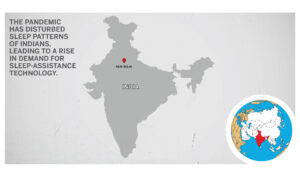
New Delhi — Losing sleep over the pandemic is a real thing. Many in India are finding it difficult to sleep well because of their altered lifestyle since Covid-19 hit the country.
Now health care firms are waking up to an opportunity to create products that help people sleep.
“We have seen a growth in all sleep-inducing products and services since the pandemic broke out,” said Vishal Gondal, founder and CEO of GOQii, a fitness technology company based in California with an office in Mumbai.
In survey results of 10,000 respondents, GOQii found that during the first 21 days of the lockdown, the average sleep hours of Indians increased. But in April, May and June, the average sleep hours declined. About 44 percent of respondents reported going to sleep later than usual, and 41 percent said they woke up later than usual.
Gondal said that the GOQii app recorded over 50,000 people using ASMR music, and over 100,000 people engaged with meditative music since the beginning of the pandemic. ASMR (autonomous sensory meridian response) is meant to elicit a feeling of well-being.
Further, he said, since August, GOQii has sold over 50,000 units of curated health products for sleep, including such items as teas.
The GOQii study also found that while 48 percent of respondents said that before the lockdown in March, they went to sleep after midnight; 56 percent said they went to sleep after midnight in April. Respondents who woke up after 8 a.m. increased from 27 percent in February to 35 percent in April.
Among the innovative products designed to help people sleep better is Sleep Stories on the Mindhouse app. In November, the mental wellness startup launched the collection of tales designed to “make bedtime a more calming and relaxing experience.” Each story has descriptive detail combined with soothing, ambient music, and voice-overs by Bollywood celebrities Rahul Bose, Konkona Sen Sharma and Amol Parashar.
“We saw app downloads grow by three times after we launched Sleep Stories,” said Dhruv Prakash, brand and communications manager at Mindhouse.
When it launched a year ago, Mindhouse offered both physical and online meditation services, but it shifted all content to the app in March 2020. Since then, 25 percent of the app’s 150,000 active users have chosen sleep as their primary goal.
“Apart from special classes for sleep improvement, the app has a special sleep library with various tools — short guided meditations that use visualization, different music tracks, and soundscapes from nature,” said Prakash.
India reported its first Covid-19 case on Jan. 30, and Prime minister Narendra Modi announced a 21-day nationwide lockdown from midnight on March 24. The lockdown was then extended it to May 3 and again to May 17.
“The pandemic has disrupted people’s routine, as most of them working from home and do not know when to sign off,” said Hrudananda Mallick, president of the Indian Society for Sleep Research. “Most people keep working well past midnight. This affects their circadian rhythm, leading to health issues.”
Humans’ biological clock cycles about every 24 hours. Circadian rhythm disorders occur when the sleep-wake cycle is not properly aligned with the environment and interferes with their daily activities.
Insomnia is also on the rise among many who are stressed by work, living alone, fearing a Covid-19 infection, or worrying about the availability of essential goods, according to an online survey conducted in India in April-May.
“Medical experts report that the number of consultation calls over erratic sleep cycles have shot up since the country went into lockdown on March 25 to stem the spread of Covid-19. This disease has brought the added baggage of stress and other psychological disorders,” said another recent study.
“One of the major functions of sleep is to ensure good immunity,” said Mallick. “As more people realize good immunity is the key to fighting Covid-19, we notice a growing awareness among them to rectify sleep deprivation and other related issues like insomnia and apnea. This is also a possible reason why sleep-assistance technology has seen a boom this pandemic.”

A research paper by Nature Partner Journal describes a five-step digital sleep framework that includes data acquisition, storage and curation, processing, modeling, and applications. The final model has medical uses that include designing clinical support systems or consumer applications like lifestyle products.
“A proper study of abdominal movement, heart rate, temperature, and many other health vitals while you sleep helps a great deal in deriving treatment solutions,” said Mallick.
Bengaluru-based health-tech startup Dozee provides a contactless health monitor system that uses thin sensor sheets designed for health monitoring and sleep correction. When placed under the mattress, the sheets are said to capture the user’s heart rate, respiration, and stress levels during sleep. Advanced machine learning and artificial intelligence algorithms then create a report and flag early health deterioration alerts.
“In the last few months, we have recorded a surge in orders for the contactless health monitor from hospitals in and outside India,” said Ankita, customer relationship manager at Dozee. “We have sold more than 1,000 devices in the last quarter alone.”
“The sleep technology is going to grow tremendously in India,” said GOQii’s Gondal.
“With the pandemic outbreak, people have grown extremely self-aware about their sleeping patterns and want to consciously make efforts to streamline it as they understand that sleeping patterns affect immunity. Therefore, and hence there will be a huge jump in wellness and health products and services.”
(Edited by Uttaran Das Gupta and Judith Isacoff. Map by Urvashi Makwana.)
The post Pandemic Awakens Demand for Sleep-Aid Technology in India appeared first on Zenger News.
